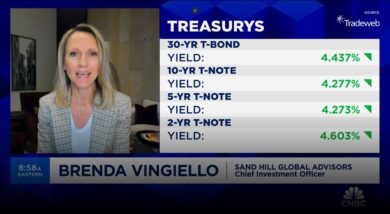Sand Hill's Chief Investment Officer, Brenda Vingiello, CFA, joins Jenny Harrington on “Halftime Report” to go over their most recent portfolio moves. Brenda's commentary begins

House Call
For many people, if they know about reverse mortgages at all it is probably limited to seeing them advertised on late night TV. They are not widely used or understood, and might even seem gimmicky; but given the right circumstances, they could be worth considering. Reverse mortgages are primarily designed for older homeowners who have equity in their homes and fixed expenses and needs, but limited income. They might also be useful tools in certain situations, like dealing with temporary illiquidity caused by slow transactions in concentrated wealth. Essentially, these products enable homeowners to borrow against themselves—or the equity in their homes—to provide income in retirement. The most common type is federally insured, but there are also proprietary products. In order to qualify for FHA approved reverse mortgages, borrowers must be 62 or older, and they must occupy their property as their principal residence. They cannot have any outstanding federal debt, including delinquent tax payments. Unlike traditional amortized mortgages that get paid down over time, reverse mortgages actually grow in size as homeowners borrow against equity and postpone interest payments until later on. As a result, income and credit requirements are typically less stringent with reverse mortgages because no payments are required along the way; but this is starting to change in the wake of the financial crisis, and stiffer requirements already apply to jumbo, or larger, reverse mortgages. Still, it could be easier to access financing from reverse mortgages than from traditional mortgages or even from home equity loans or lines of credit.
The borrower can gain income in various ways: monthly payments over a specified period of time or over (joint) lifetimes; upfront lump sums or as needed from revolving lines of credit; or in some combination of these methods. Except for less common single-purpose loans, there are no restrictions on how the cash can be used; and since the IRS does not consider loan advances to be income, the payouts are not subject to income tax. However, in order to minimize the chance for misunderstanding and confusion with such an important asset as the home—especially among older borrowers—counselors are required for anyone seeking FHA approved loans. Typically, more money can be borrowed when interest rates are lower, the borrower is older, and the house is more valuable. Of course, the recent housing crisis adversely affected values across the country; but many areas are now recovering—and more importantly, interest rates remain very low. Despite the downturn, many older people still have significant equity in their homes, having participated in the multi-decade long run up in housing values. Like traditional mortgages, reverse mortgages come in either fixed rate or variable rate terms; and borrowers can either lock in greater certainty (with fixed rate products) or play out the evolving interest rate environment with variable products. Even when a reverse mortgage is in place, though, the title to the property still remains with the homeowner, and the borrower/homeowner is still responsible for all maintenance and repair of the property as well as property taxes.
The reverse mortgage comes due when the borrower dies, moves or sells the property—and at that point the loan is due in full plus all accrued interest. Many loan providers offer what are called “no negative equity guarantees,” which means that there can be no claim against the estate or its beneficiaries for more that the balance of the loan even if it exceeds the ultimate value of the property when it is sold. This is an important feature and one that anyone considering a reverse mortgage should desire; and this applies to the FHA program. Still, since interest compounds over the life of the loan without anything due along the way, the full balance that is eventually owed can balloon and surprise homeowners later in life. For this reason, people have typically not relied upon their homes to finance their retirement. They also do not like the notion of selling their entire home to finance expenses, and they may simply not want to move out of their homes anyway. Unfortunately, many retirees do not have sufficient alternative savings to meet their needs—and traditional pensions have steadily disappeared as well. But unlike trimming an investment portfolio of stocks and bonds, houses cannot be sold off in bits and pieces. As a result, reverse mortgages could help in certain situations, even being used like catastrophic insurance—not to cover day-to-day expenses, but to provide an umbrella for major costs and/or possibly long-term care.
Articles and Commentary
Information provided in written articles are for informational purposes only and should not be considered investment advice. There is a risk of loss from investments in securities, including the risk of loss of principal. The information contained herein reflects Sand Hill Global Advisors' (“SHGA”) views as of the date of publication. Such views are subject to change at any time without notice due to changes in market or economic conditions and may not necessarily come to pass. SHGA does not provide tax or legal advice. To the extent that any material herein concerns tax or legal matters, such information is not intended to be solely relied upon nor used for the purpose of making tax and/or legal decisions without first seeking independent advice from a tax and/or legal professional. SHGA has obtained the information provided herein from various third party sources believed to be reliable but such information is not guaranteed. Certain links in this site connect to other websites maintained by third parties over whom SHGA has no control. SHGA makes no representations as to the accuracy or any other aspect of information contained in other Web Sites. Any forward looking statements or forecasts are based on assumptions and actual results are expected to vary from any such statements or forecasts. No reliance should be placed on any such statements or forecasts when making any investment decision. SHGA is not responsible for the consequences of any decisions or actions taken as a result of information provided in this presentation and does not warrant or guarantee the accuracy or completeness of this information. No part of this material may be (i) copied, photocopied, or duplicated in any form, by any means, or (ii) redistributed without the prior written consent of SHGA.
Video Presentations
All video presentations discuss certain investment products and/or securities and are being provided for informational purposes only, and should not be considered, and is not, investment, financial planning, tax or legal advice; nor is it a recommendation to buy or sell any securities. Investing in securities involves varying degrees of risk, and there can be no assurance that any specific investment will be profitable or suitable for a particular client’s financial situation or risk tolerance. Past performance is not a guarantee of future returns. Individual performance results will vary. The opinions expressed in the video reflect Sand Hill Global Advisor’s (“SHGA”) or Brenda Vingiello’s (as applicable) views as of the date of the video. Such views are subject to change at any point without notice. Any comments, opinions, or recommendations made by any host or other guest not affiliated with SHGA in this video do not necessarily reflect the views of SHGA, and non-SHGA persons appearing in this video do not fall under the supervisory purview of SHGA. You should not treat any opinion expressed by SHGA or Ms. Vingiello as a specific inducement to make a particular investment or follow a particular strategy, but only as an expression of general opinion. Nothing presented herein is or is intended to constitute investment advice, and no investment decision should be made based solely on any information provided on this video. There is a risk of loss from an investment in securities, including the risk of loss of principal. Neither SHGA nor Ms. Vingiello guarantees any specific outcome or profit. Any forward-looking statements or forecasts contained in the video are based on assumptions and actual results may vary from any such statements or forecasts. SHGA or one of its employees may have a position in the securities discussed and may purchase or sell such securities from time to time. Some of the information in this video has been obtained from third party sources. While SHGA believes such third-party information is reliable, SHGA does not guarantee its accuracy, timeliness or completeness. SHGA encourages you to consult with a professional financial advisor prior to making any investment decision.
Other Posts By This Author
- – Fiscal Sponsorship for Charity
- – Risky Business
- – Emotional Rescue
- – Children in Cars Getting Coffee… or Anything Else
Related Posts







